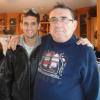By Whitney Hale, Mack McCormick
Kentucky may be horse-racing and basketball country, but when it comes to your taste buds, the Bluegrass State is a foodie haven with a rich culinary tradition. From the famed mint juleps of the Kentucky Derby to slow-smoked mutton in the western part of the state, bourbon and barbecue have deep roots in the Bluegrass State. Kentucky may be America’s first frontier, but its flavors and food traditions have lured a new wave of travelers to the region.
Three new books from the University Press of Kentucky explore the traditions and dining experiences of the Commonwealth. The Kentucky Barbecue Book by Wes Berry, Kentucky Bourbon Whiskey: An American Heritage by Michael R. Veach, and The Old Fashioned: An Essential Guide to the Original Whiskey




















